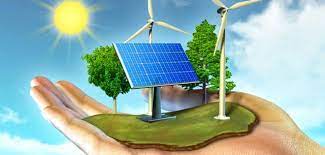In the global pursuit of a sustainable future, the renewable energy sector emerges as a beacon of hope, offering clean and environmentally friendly alternatives to traditional energy sources. As the demand for energy continues to rise, the sustainability of the renewable energy sector becomes increasingly vital. In this article, we explore the key aspects and innovations driving sustainability in the renewable energy sector.
The Imperative for Renewable Energy
The urgency to address climate change and reduce carbon emissions has propelled the renewable energy sector to the forefront of global energy discussions. Renewable sources, such as solar, wind, hydro, and geothermal, hold the promise of providing energy without the detrimental environmental impacts associated with fossil fuels.
The Sustainability Challenge
While renewable energy sources are inherently more sustainable than fossil fuels, challenges persist in ensuring the entire renewable energy lifecycle aligns with sustainable practices. From resource extraction and manufacturing to end-of-life considerations, the sector strives for holistic sustainability.
Efficient Solar Photovoltaics
Technological advancements in solar photovoltaics (PV) enhance energy conversion efficiency. Improvements in materials, design, and manufacturing processes contribute to higher performance and lower environmental impact, making solar energy more sustainable and accessible.
Next-generation Wind Turbines
In the wind energy sector, next-generation turbines are larger, more efficient, and technologically advanced. Innovation in turbine design, materials, and grid integration maximizes energy output while minimizing the environmental footprint, contributing to long-term sustainability.
Advancements in Battery Technology
Energy storage is a critical component for renewable energy sustainability. Advancements in battery technology, including lithium-ion and emerging technologies like solid-state batteries, improve energy storage capacity, efficiency, and recyclability.
Pumped Hydro Storage
Pumped hydro storage systems act as large-scale batteries by storing and releasing energy. These systems utilize excess energy during periods of low demand to pump water to higher elevations, releasing it to generate electricity during peak demand, providing grid stability and energy storage.
Integration of Smart Grids
Smart grids enable efficient energy distribution, demand response, and integration of diverse energy sources. The optimization of energy flow and consumption contributes to a more resilient and sustainable energy infrastructure.
Demand-side Management
Implementing demand-side management strategies allows for the flexible consumption of energy based on demand fluctuations. By incentivizing consumers to shift energy use to off-peak hours, demand-side management reduces the strain on the grid and enhances overall sustainability.
Sustainable Materials and Manufacturing
Ensuring the sustainability of renewable energy involves using eco-friendly materials and adopting sustainable manufacturing practices. From solar panels to wind turbines, the industry focuses on minimizing environmental impact throughout the production process.
End-of-life Considerations
Managing the end-of-life phase of renewable energy technologies is crucial. Developing efficient recycling processes for solar panels, wind turbine blades, and batteries minimizes waste and ensures responsible disposal practices, contributing to the overall sustainability of the sector.
Distributed Generation
Decentralized energy systems, characterized by distributed generation sources, reduce transmission losses and enhance grid resilience. This approach, incorporating small-scale renewable energy installations, promotes sustainability by minimizing energy transportation and optimizing local resources.
Community-based Renewable Projects
Community-based renewable energy projects empower local communities to actively participate in and benefit from renewable energy initiatives. These projects foster sustainability by promoting community engagement, reducing reliance on centralized energy sources, and enhancing energy resilience.
Supportive Regulatory Frameworks
Government policies and regulatory frameworks play a pivotal role in promoting sustainability in the renewable energy sector. Incentives, subsidies, and mandates encourage the adoption of renewable technologies, fostering a conducive environment for sustainable practices.
Industry Collaboration and Advocacy
Collaboration within the industry and advocacy for sustainable practices are essential. Sharing best practices, adopting common standards, and collectively addressing challenges contribute to the overall sustainability and growth of the renewable energy sector.
Conclusion
Sustainability in the renewable energy sector is a multifaceted endeavor that encompasses technological innovation, energy storage solutions, smart grids, lifecycle considerations, decentralized energy systems, and supportive policy frameworks. As the sector continues to expand and evolve, a commitment to holistic sustainability becomes increasingly critical.By prioritizing sustainability at every stage of the renewable energy lifecycle, from conception to decommissioning, the sector can fulfill its promise as a transformative force in addressing climate change and securing a cleaner, more sustainable energy future.
